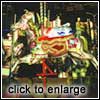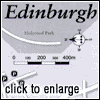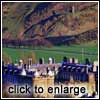|
Entertainment
Many visitors come to Edinburgh specifically for the
Edinburgh International Festival held for 3 weeks every year in August when the town
is taken over by thespians of every sort who put on more than 13,000 performances
per festival.
 The Festival was started in 1947 to help shake off the gloom
of the post war years and with several names of international stature supporting
it, the new festival got off to a good start. The Fringe started at the same time
and is now the world's largest arts festival with over 500 performances each day
supported by 450 companies. During this time the Military Tattoo is held every night
in the Castle Esplanade. A more recent development to try and bridge the tourist
gap around the Christmas holiday is 'Edinburgh's Hogmanay' with several attractions
culminating in the traditional Edinburgh gathering around the Tron Church on the
Mile to bring in New Year. The Festival was started in 1947 to help shake off the gloom
of the post war years and with several names of international stature supporting
it, the new festival got off to a good start. The Fringe started at the same time
and is now the world's largest arts festival with over 500 performances each day
supported by 450 companies. During this time the Military Tattoo is held every night
in the Castle Esplanade. A more recent development to try and bridge the tourist
gap around the Christmas holiday is 'Edinburgh's Hogmanay' with several attractions
culminating in the traditional Edinburgh gathering around the Tron Church on the
Mile to bring in New Year.
Edinburgh has a particularly lively pub scene around
the centre. Hostelries of interesting historical and architectural significance are
included in several trails from the Grassmarket to Rose Street.
Pubs have replaced the old coffee-houses of Edinburgh's
past and are an important element of local culture. Some worth visiting for their
atmosphere would be The Last Drop and the Preservation Hall around the Grassmarket,
Deacon Brodie's Tavern in Bank Street at the corner with the Royal Mile and the Auld
Toll Bar just beyond the Toll Cross in Bruntsfield Place.
Check out the Rose Street Brewery also, one of the
many public houses along this colourful back street.
The rest of Edinburgh
 The areas just beyond the Old and New Towns are peppered with
good places to escape from the crowds. The areas just beyond the Old and New Towns are peppered with
good places to escape from the crowds.
Beneath the south side of the castle is the rectangular
Grassmarket, once an agricultural marketplace but now dominated by car parking along
with some good pubs, restaurants and interesting shops. Following Castle Wynd Steps
or Victoria Street off George IV Bridge can reach it.
Here you find a host of little antique or curiosity
shops along with the famous Brush Shop, one of the least changed stores in Edinburgh
since the 1950s selling brushes of all shapes, balls of string and other household
tackle.
The cross at the bottom of Victoria Street is where
more than 100 Covenanters were hung for following their beliefs. The Traverse Theatre
stands opposite, one of Edinburgh's several experimental stages. Famous Grassmarket
residents were Burke and Hare, grave-robbers who turned to murder as a quick way
of providing corpses for the medical faculty. Ironically, Burke's skeleton can still
be seen in the Department of Anatomy in the University of Edinburgh.
On George IV Bridge itself stands the National Library
of Scotland. This is a huge complex holding every book ever published in Britain
as well as many rare manuscripts and letters including the last letter Mary Queen
of Scots wrote to her cousin, Queen Elizabeth, who had imprisoned her and condemned
her to death. There are also the orders that commenced the Massacre of Glencoe in
1692.
 Greyfriars at the end of George IV Bridge is the site of a
medieval monastery. In 1638 the National Covenant was signed in the Greyfriars Kirkyard
behind the pub, declaring the independence of the Presbyterian Church of Scotland
from government control. This victorious event was followed by years of civil war,
great bitterness and bloodshed. Greyfriars at the end of George IV Bridge is the site of a
medieval monastery. In 1638 the National Covenant was signed in the Greyfriars Kirkyard
behind the pub, declaring the independence of the Presbyterian Church of Scotland
from government control. This victorious event was followed by years of civil war,
great bitterness and bloodshed.
The delightful little statue of Greyfriars Bobby stands
outside the pub, his story told to children around the world. Further south towards
Liberton is the Royal Observatory at Blackford Hill where public telescopes are available
during the winter months.
On the north-west corner of the New Town sheltering
under Thomas Telford's expansive Dean Bridge built in 1829, there is a charming group
of buildings called Dean Village. Set around the Water of Leith this former milling
community has been rescued from decline and transformed into a 'yuppified ghetto'.
Many of Dean Village's buildings appear Tudor or early Victorian.
From here you can walk following the Water of Leith
to Stockbridge, in fact the river runs from the Pentland Hills and into the docks
at Leith with walks for most of its length. Stockbridge was another older community,
this time being engulfed by the sprawling second phase of the New Town development.
 If you wish to wander further afield a pleasant walk over
the Water of Leith brings you to the Royal Botanic Gardens. These 70 acres (28 hectares)
are casually arranged more like a well-tended wood and decorated with rhododendrons
and azaleas. The glass houses and pavilion display more exotic vegetation in a steamy,
tropical environment. From Princes Street catch buses 23 or 27. If you wish to wander further afield a pleasant walk over
the Water of Leith brings you to the Royal Botanic Gardens. These 70 acres (28 hectares)
are casually arranged more like a well-tended wood and decorated with rhododendrons
and azaleas. The glass houses and pavilion display more exotic vegetation in a steamy,
tropical environment. From Princes Street catch buses 23 or 27.
Leith has had a chequered history through the centuries,
sometimes riding high in favour as Edinburgh's seaport then, in more recent times,
suffering high unemployment and dereliction amongst a jungle of dilapidated tenements.
To many locals, it remains a separate town but it has recently been embraced by Edinburgh's
fashionable faction and become recherché (with popular wine bars and bistros
blossoming along its attractive water-front.
The south side of Edinburgh has several nearly autonomous
communities that have their own distinct flavour. From the areas of Bruntsfield to
Morningside, the main road is lined with dozens of interesting shops that would take
a few hours to explore.
For golfers, a trip to the Braid Hills group of municipal
courses is essential. Braid No.1 is one of the most interesting heathland courses
and the views of the city are tremendous.
On the west side of town Edinburgh Zoo, in the Murrayfield
district, is reached by bus or Taxi from Princes Street. The zoo is one of Britain's
best and has over 1,000 birds, reptiles and mammals housed in 80 acres of scenic
landscaped parkland at the base of Corstorphine Hill. A 'Penguin Parade' is held
daily from April to September at 2pm in the world's largest penguin enclosure complete
with underwater viewing.
|




